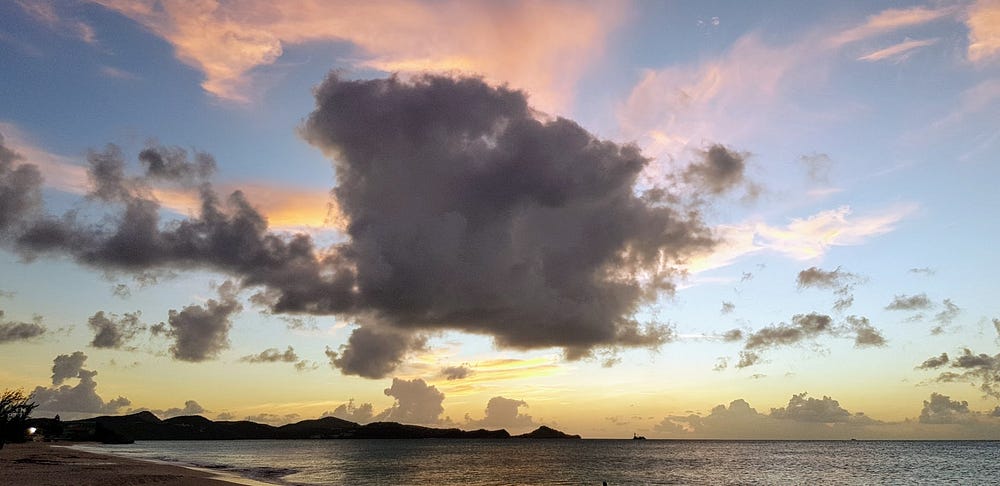Hacking Storms in Antigua with the UN
Sometimes a seemingly strange opportunity comes your way and you just have to roll with it.
Such was the situation two weeks ago when a last-minute opportunity came our way at Samsung Internet Developer Advocacy to present and judge at a UN-sponsored hack-a-thon in Antigua. The organization that was running the hack, Ocean Generation (more on them later), was looking for someone with technical expertise to sit on the judging panel.
Judging panel at #DADLIHACK.
The event, #DADLIHACK 2018 (after the historical name for the island), was to focus on recovery from storms. Ocean Generation, who developed and produced the hack, is an organization supported by UNOPS that focuses on driving awareness in young people (the “generation” of Ocean Generation) about the plight of Earth’s oceans and the impacts of climate change.
The hack brought together 15 teams from around the region including Barbados, St. Kits & Nevis, Jamaica, St. Lucia and of course Antigua & Barbuda.
The nation of Antigua & Barbuda had a particularly rough time with storms last year. When Hurricane Irma hit, it decimated the smaller island of Barbuda, basically wiping out all infrastructure and necessitating a mass evacuation of its inhabitants to the island of Antigua (which suffered far less, partly due to its geography and partly due to the path the storm took). Six months later that population is still in exile, although the infrastructure of Barbuda is slowly being built back up.
US aids mass evacuation of devastated Caribbean islands
_Lush island paradises in the Caribbean were obliterated by Hurricane Irma, leaving thousands of residents battling…_nypost.com
However, Antigua & Barbuda are hardly alone in their sensitivity to storms. All the islands in this chain are prone to the same seasonal devastation. And these storms are getting worse, year on year.
The One Number That Shows Why Climate Change Is Making Hurricane Season Worse
_Hurricanes Irma and Harvey have reignited discussions about the link between global warming and extreme weather. This…_time.com
What role can technology play? UNOPS (the United Nations Office for Project Services) has been deploying various technologies to mitigate against disasters (both natural and man-made) and to aid in recovery scenarios as part of its mission to support development projects world-wide. This was the background to the hack’s goals of developing prototypes that could “help communities receive support, relief or to recover after storms.”
Kicking off the hack, which was ably MC’d by Sophie Freiermuth, we had talks from Elvis Murray Watkins of Red Cross Antigua & Barbuda and Sherrod James of the National Office of Disaster Services, Antigua & Barbuda. From them, we got a stark description of the situation these islands face, and the challenges they have to deal with in recovery situations.
Elvis Murray Watkins of Red Cross Antigua & Barbuda presenting at #DADLIHACK
Sherrod James of the National Offices of Disaster Services of Antigua & Barbuda presenting at #DADLIHACK
We also heard from people like Makŏ Williams who heads up iLab Global which was running a kids’ coding camp for local teens as part of the #DADLIHACK initiative (also supported by The Ocean Generation and UNOPS) with help from Fire Tech Camp and PiTop.
Mako Williams of iLab Global presenting at #DADLIHACK
Kids learning on PiTops at iLab Global in Antigua
By the way, Makŏ was also my landlord for the weekend and her house is lovely and commands an amazing view over Fitches Creek Bay.
Some of the challenges put to the participants had to do with infrastructure and lack thereof. For example: what good is a smartphone app when cellular and electricity infrastructure is blown away? Many of the teams envisioned using bluetooth or wifi mesh technologies to work around network outages. Others conceived using off-line support in Progressive Web Apps to enable apps to function while off-line and sync back with “the cloud” when connectivity became available.
#DADLIHACK winning team, Mack 360
The winning team, Mack360 from Barbados, developed a plan and built a working prototype of a set of progressive web applications (with a focus on off-line use) that would connect people with information, agencies and disaster relief organizations. They will receive 10k USD and additional support from UNOPS to help develop their prototype into an application that can be deployed across the region and hopefully help real people. Two other teams, Hacker Hostel from Jamaica and Imperial from Antigua, each walked away with $1000. However, I was impressed with the quality and energy applied to the problem from all the competing teams. I was also impressed by the diversity and inclusive feeling of this event (which also ran under a very strong code of conduct which was reiterated on stage a number of times by Sophie).
Special thanks need to go out to the team from Ocean Generation running the show and to the Antigua & Barbuda International Institute Technology for being such a great host. The WiFi, power and A/V were solid, which is the backbone of any event like this, and ABIIT’s classrooms were particularly well suited for the teams.
In the end, I personally left with a much greater understanding of the challenges faced in the region as well as an appreciation for the technical talent lined up to face down those challenges. And yes, I did manage to get to the beach one day — for about an hour. It was beautiful. Hopefully with the continued help of UNOPS and Ocean Generation we can keep it that way.

Sunset over Antigua
Tagged in Climate Change, Storms, Hackathons, United Nations, Caribbean
